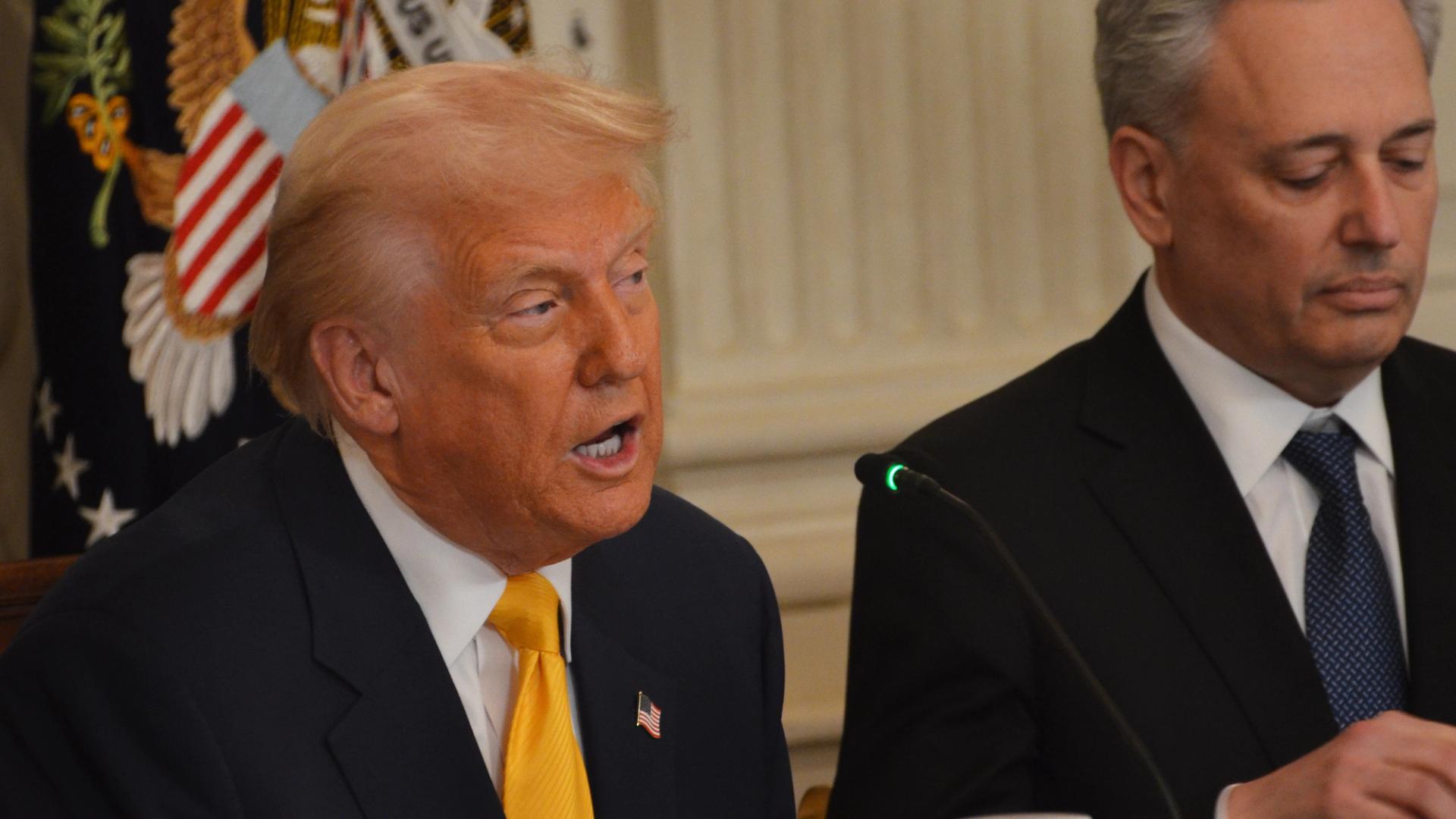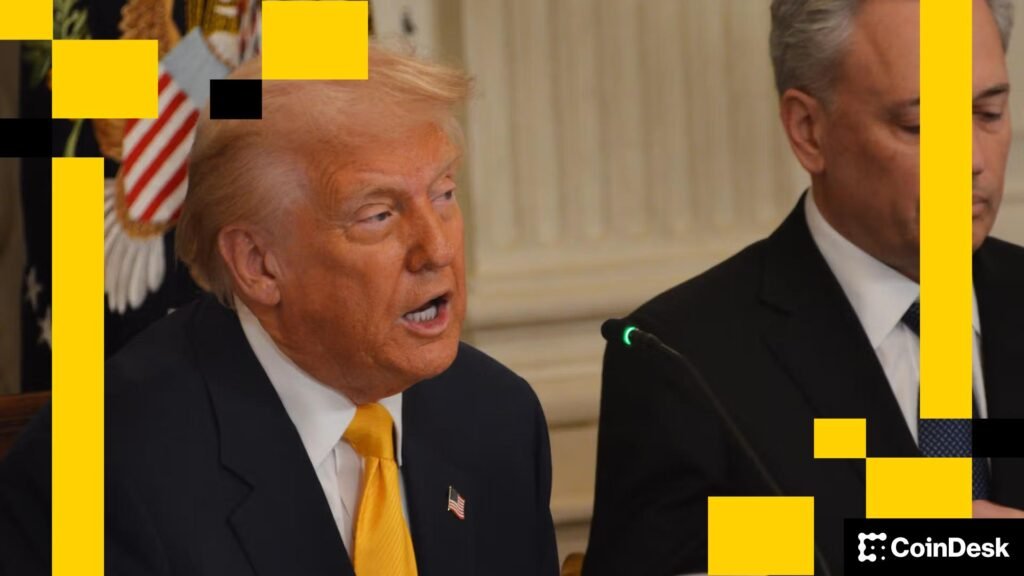
WASHINGTON, D.C. — Donald Trump was elected president again one year ago this week, though some of the crypto industry’s lobbyists quietly say they feel like they’ve aged many years in this tumultuous 12 months, which saw a range of lofty highs and deep frustrations in the young sector’s hunt for U.S. policies.
President Trump surged back into the White House with wide support from crypto voters and optimism from many of the most prominent U.S. leaders of the industry that he’d secure their place in the U.S. financial system. In many ways, that faith in the politician has paid off.
He quickly issued executive orders demanding progress on friendly crypto policies and the establishment of a bitcoin reserve to stash the government’s holdings as a long-term investment.
“Since day one he has issued executive orders and moved for agencies to pay attention to digital assets and how blockchain can increase transparency across the government,” said Cody Carbone, CEO of the Digital Chamber, in a statement to CoinDesk.
In Congress, the industry shifted from pariah of 2022 (during its struggles with failing firms and fraud prosecutions) to a top priority of 2025, with significant support from a president who made continual demands of allied lawmakers. In a stunning example of rapid, bipartisan legislating, the Guiding and Establishing National Innovation for U.S. Stablecoins Act (GENIUS) Act became law, the first major U.S. crypto policy effort to do so.
The Trump administration’s Treasury Department and banking agencies have already begun trying to sort out its implementation — a lengthy process as it winds its way through public-comment periods and eventually through multiple rule proposals.
The GENIUS Act was meant as a companion to advance alongside the more important legislation that would set up rules of the road for U.S. crypto markets beyond the stablecoin issuers. While that effort again passed in the House of Representatives this year, the Senate hasn’t yet acted.
As he continues goading Congress, Trump has made some consequential appointments to run the U.S. financial regulators. At the top of that list for crypto advocates is Paul Atkins, who was confirmed to lead the Securities and Exchange Commission. Atkins is a crypto supporter who made friendly new policies his top priority at the agency. He’s lately promised concrete rule proposals in the coming months.
Trump also installed Jonathan Gould, a former crypto lawyer, atop the Office of the Comptroller of the Currency.
“The past year has delivered what many thought impossible: a complete reversal of federal crypto policy, transforming America from a jurisdiction defined by regulation-by-enforcement to one that’s racing to lead the global digital economy,” said Kristin Smith, president of the Solana Policy Institute.
On the flip side of his administration’s crypto progress, Trump’s volatile leadership has potentially threatened other parts of the agenda. The current, prolonged shutdown of the federal government — the longest-ever, beating the record set during Trump’s first term — has contributed to a derailing of the Senate’s legislative work, including the single most important U.S. policy aim for crypto: the market structure bill.
Polling has consistently shown voters blame Trump and Republican lawmakers more for the shutdown than Democrats. The budget impasse not only redirects lawmakers’ energies toward settling that dispute, but it also has furloughed federal workers who are meant to focus on helping write the legislation.
Even without closing down government operations, the legislative negotiations were at a precarious point, with some Republicans balking at the idea the Senate’s version of the House’s Digital Asset Market Clarity Act was ready to advance. Some crypto lobbyists have privately shifted their expectations as far as 2027 before Congress will finish that job, because next year’s midterm elections would be expected to turn Capitol Hill into a political battlefield in which bipartisan action could become difficult.
The shuttered doors of government have also stalled the industry’s pursuit of product approvals and public-offering pursuits that need sign-off from the SEC.
And despite Trump’s orders to set up crypto reserves at the federal level, that project hasn’t gone anywhere past the planning stage. Those working on it have suggested congressional action may be needed to clear the final hurdle to establish the funds. Like other legislative efforts beyond the market-structure push — such as overhauling the tax code for crypto activity — this one could be waiting in line for a while.
Meanwhile, though the crypto industry has lined up a long list of allies among Democratic lawmakers, Trump has drawn sharp criticism from members of the opposition party for his personal stake in digital assets businesses. There are few corners of the sector his and his family’s interest don’t touch, and the potential conflicts of interest for the president came to a head when the biggest holders of his memecoin were invited to a private evening event with him.
Many of the top investors in Trump’s coin were foreign nationals, and the administration declined to identify those attending the dinner and rubbing elbows with the president.
Also, Trump’s successes in appointing regulators, such as at the SEC, OCC and in slowly remaking the Federal Reserve’s Board of Governors, have been countered somewhat by challenges, such as his having to withdraw his first choice as chairman for the Commodity Futures Trading Commission.
Most of the prominent leaders of the industry have become cozy with Trump, and White House crypto events have seen CEOs and founders — such as the chiefs of Coinbase, Ripple, Tether and Gemini — eagerly participating in the president’s celebrations. But while that relationship has strengthened, the president’s public popularity has fallen. In this opening year of his second administration, Trump’s approval ratings have declined rapidly to plumb depths not touched by other recent presidents, with 58% disapproving of the job he’s doing — especially the younger voters who had been relatively enthusiastic about giving him a return to the White House.
As this week saw a number of state-level elections considered potential bellwethers for the congressional midterms a year from now, the voting public’s feelings about Trump’s presidency were on potential display. One year after reelecting Trump, they rebounded dramatically toward supporting Democratic candidates. If that holds for the 2026 midterms, Democrats could make gains in Congress and possibly retake the House majority, ending the lock Republicans hold across the executive and legislative branches of government.
If that takes place on Trump’s watch, his crypto agenda may have to adjust to a more overtly bipartisan cooperation during his final two years in office. But Trump’s opening year has already provided more policy progress than the industry had ever achieved before, and advocates say it’s having significant results on U.S. businesses.
“We’ve seen digital asset companies reshore operations, expand their presence and grow headcounts as a result of President Trump and a pro-crypto Congress,” said Summer Mersinger, the CEO of the Blockchain Association who was a recent U.S. commodities regulator in this administration.




